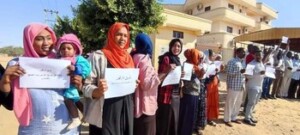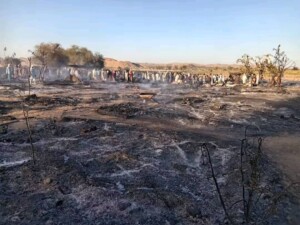Sudan reports a slight decrease in new Covid-19 cases
On Thursday, the Sudanese Ministry of Health announced 78 new registered Covid-19 cases in the country. This is less than Tuesday, when 100 new coronavirus patients were reported.
In its regular daily briefing on Thursday, the Ministry of Health said that 55 new coronavirus patients were registered in Khartoum, six each in Sennar and El Gezira, five in El Gedaref, two each in Northern State and West Darfur, and one case in each of North Darfur and North Kordofan.

On Thursday, the Sudanese Ministry of Health announced 78 new registered Covid-19 cases in the country. This is less than Tuesday, when 100 new coronavirus patients were reported.
In its regular daily briefing on Thursday, the Ministry of Health said that 55 new coronavirus patients were registered in Khartoum, six each in Sennar and El Gezira, five in El Gedaref, two each in Northern State and West Darfur, and one case in each of North Darfur and North Kordofan. Three patients died. 12 people recovered, which brings the total number of recovered cases to 92.
On Wednesday, the First Undersecretary of the Ministry of Culture and Information, El Rashid Saeed, pointed to a decrease in new cases. “There is a significant improvement due to the application of precautionary measures”, he said. He therefore urged all people in Sudan to adhere to the measures announced by the Ministry of Health, including social distancing and the prevention of gatherings.
The total number of recorded Covid-19 cases in the country reached 930, including 52 fatalities. 15 out of Sudan’s 18 states are affected.
According to the overview of coronavirus cases as of Wednesday, published by the UN Office for the Coordination of Humanitarian Affairs (OCHA) in Sudan in its latest Situation Report, that apart from Khartoum, the states of Kassala, El Gedaref, Sennar, and North Kordofan are most affected by the Covid-19 pandemic.

are not warranted to be error free nor do they necessarily imply official endorsement or acceptance by the UN
Precautionary measures
According to OCHA, eight states in Sudan have implemented containment measures to limit the spread of the infectious disease.
Khartoum state is under a three-week lockdown since 18 April. Bridges linking Omdurman and Khartoum North are closed. The borders with neighbouring states have been closed, with the exception for commercial vehicles carrying strategic commodities such as food, medicines, and fuel.
People can access neighbourhood shops, bakeries and pharmacies between 6 am and 1 pm daily. The Ministry of Awqaf (Religious Endowments) has suspended prayers in mosques and churches services for three weeks.
Fines will be levied for people breaking the curfew, people assaulting doctors, people monopolising food and medicines, or people spreading false information.
The lockdown will most probably be extended, according to Sudan’s Health Ministry.
North Kordofan has closed its borders with other states as well and has deployed police and security forces at entry points. Only basic commodities are allowed to enter the state.
In South Kordofan, all gatherings have been banned including all celebrations, Ramadan iftars and prayers at mosques, and queues in front of bakeries and fuel stations. The weekly market has been closed. Public transportation and busses need apply social distancing.
Pharmacies and shops in El Fasher, capital of North Darfur, are closed from 2 pm to 6 am, as of April 26 until further notice. Ramadan iftars in groups and prayers in mosques have also been banned. All government personnel, except for emergency staff, have been given a paid leave starting on May 4 until after the Ramadan Eid. Entrances to El Fasher are blocked. International borders with Chad and Libya have been closed since 25 March.
The South Darfur government also banned gatherings. Markets close at 2 pm except for pharmacies, bakeries, gas shops, water yards, and water trucks. Only Friday prayers can be performed at mosques. The borders with Chad and Central African Republic, neighbouring states, and the state borders between localities have been closed.
West Darfur closed all markets throughout the state after 2 pm. All public transport has been banned. Gatherings are prohibited. Group Ramadan iftars are banned. Prayers mosques can be done in open areas. The state’s borders are closed, as well as all entry points to the state capital of El Geneina.
White Nile state has imposed a curfew from 6 am to 4 pm, banned gatherings and closed all shops, except for groceries, bakeries, pharmacies, and electrical shops. State employees have been given paid leave except for staff of strategic ministries such as electricity, water, health, armed forces, police, and security forces. The borders between localities are closed. Movement of strategic commercial goods (food, medicine, fuel etc.) is allowed.
A curfew from 6 pm to 6 am came into effect in Blue Nile state on April 24. During these hours, transport is banned and all public and commercial stores, cafes and restaurants are closed, except for health institutions and pharmacies.
Precautions in other places
Several cities and town in other states have taken precautionary measures as well, as Radio Dabanga reported earlier this month and in April.
The governor of the Red Sea state decided to shut the borders of the state and its localities as of April 26. Shops and markets in Port Sudan must close at 3 pm, with the exception of bakeries, pharmacies, and health institutions.
The city of El Gedaref in eastern Sudan went into a total lockdown on April 27. The authorities deployed security forces to maintain social distancing. Yesterday, they announced a three-day suspension of the lockdown.
On April 28, the governor of Kassala banned all gatherings in the state, including the daily collective breaking of the Ramadan fast, and congregational prayers in all mosques and squares.
In Sennar, an entire village was put in quarantine after the emergence of a coronavirus patient.
The security committee of El Nahud in West Kordofan decided to close the entrances to the town in early May. Abu Hamed locality in River Nile state prolonged its curfew from 12 pm to 6 am for another two weeks. On May 6, En Nahud locality closed all shops for a week. Pharmacies, butchers, bakeries, mills, groceries, and vegetable shops are allowed to stay open until 2 pm. Abu Hamed locality granted its employees paid leave for two weeks.
In Saraf Omra in North Darfur, all markets are allowed to open between 6 am and 2 pm since May 6. Transport of people from and to the locality has been banned. Commercial vehicles carrying goods are allowed on the condition that they do not carry passengers.
Medics in various states complain about the absence of Personal Protection Equipment (PPEs). On April 21, Radio Dabanga reported that a shortage of PPEs prompted many doctors to stay at home in the country for fear of contracting Covid-19.
Radio Dabanga’s editorial independence means that we can continue to provide factual updates about political developments to Sudanese and international actors, educate people about how to avoid outbreaks of infectious diseases, and provide a window to the world for those in all corners of Sudan. Support Radio Dabanga for as little as €2.50, the equivalent of a cup of coffee.












 and then
and then